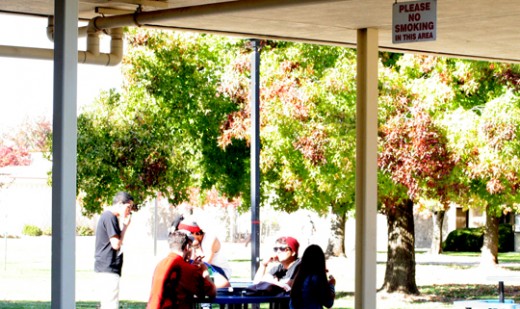
It would be cliche to say that smoking is harmful, and that it shortens your life. An anecdote, something any layman, Average Joe, Plain Jane, or simpleton knows. Second-hand smoking is worse than smoking a cigarette yourself because the smoke is not going through any sort of filter and with this knowledge people have been smoking in no-smoking areas. This is becoming an everyday problem, especially here at Yuba College.
According to the Yuba College’s smoking policy found on its website, both teachers and students are responsible for warning those who smoke in areas that they should not. But, smoking in these areas is also against California law and has been since 2004.
The above mentioned law “prohibits smoking within 20 feet of any entrances to public buildings, such as public schools, community colleges, jails, government buildings and publicly-owned medical centers.” It is common knowledge that second-hand smoke is harmful, and these harmful effects are the reasoning behind the this law.
But even though this law and Yuba College’s smoking policy are in place, people still smoke in non-smoking areas. Yuba College student and non-smoker Matt Kearns says, “Smokers should respect the non-smokers choices in the same way non-smokers have always respected the smoker’s choices.” The smokers of Yuba College have many places that they can smoke: parking lots, the walkways, etc.
One must also take into account people who might have asthma, or some other respiratory condition. “It is disrespectful,” says student Ronald Camp who occasionally suffers from asthma.

According to no-smoke.org, there are around twenty smoke-free campuses in California and the entire UC system will impose a complete smoking ban by 2014 as well. Even a campus in the Yuba College district has implemented a complete ban, the Woodland Campus west of Yuba College. These campuses cite health problems and the overall unpleasantness that stems from smoking. But, Yuba College itself has a significant smoking population.
Some smokers at Yuba College are completely against the idea of a smoking ban and non-smoking areas. “I think it’s bullshit,” says student Gary Stratton. Another student smoker, Angelina Slater believes that if there is a ban, people will just smoke anyway. She thinks the policy should stay the same, and if possible, there should be a larger smoking area. A change won’t be able to happen overnight, however.
The ease with which a change can be made will be hampered if Proposition 30 does not pass. If it does pass, than money can be allocated to a new project for creating designated smoking zones, or larger no-smoking signs. Associated Students of Yuba College (ASYC) president, Cory Larsen, believes that the biggest obstacle besides a lack of funding is getting the college administration to accept a ban or some type of stricter no-smoking position.
Even with a ban, smoking would not be a ticketable offense. Students, teachers, and faculty alike would have to police each other in order for it to be effective. Moreover, a ban would concentrate smokers in the campus parking lots (the only place one would be able to smoke) and may be retroactive, according to Larsen.
A survey is in the works, according to the ASYC. This survey will help the college figure out just how many people smoke here, and how they feel about current and/or future policies on smoking. The survey, proposed by student Hancel Chavez Ferreyra, is meant to “get a better grasp on the students’ stance on smoking on campus.” Ferreyra urges smokers violating the no-smoking policies to “Just be decent,” and to either move or put their cigarettes out.
Yuba College’s current smoking policies rely on common sense and decency. There are some who want a complete ban, and others who want the freedom to light-up on campus. All those who are interested with the smoking issue can attend an ASYC meeting on any Thursday at 12:00 in room 302.
I was born in Roseville. I moved to Olivehurst in 2007, and graduated from Lindhurst High School in 2011. I enjoy playing synthesizers and drums, as well as computer programming.
Comment Policy: Comments are welcomed and encouraged. However, the editorial board reserves the right to edit or delete, without notice, any comments submitted to the blog. For more details, see our full Comment Policy.